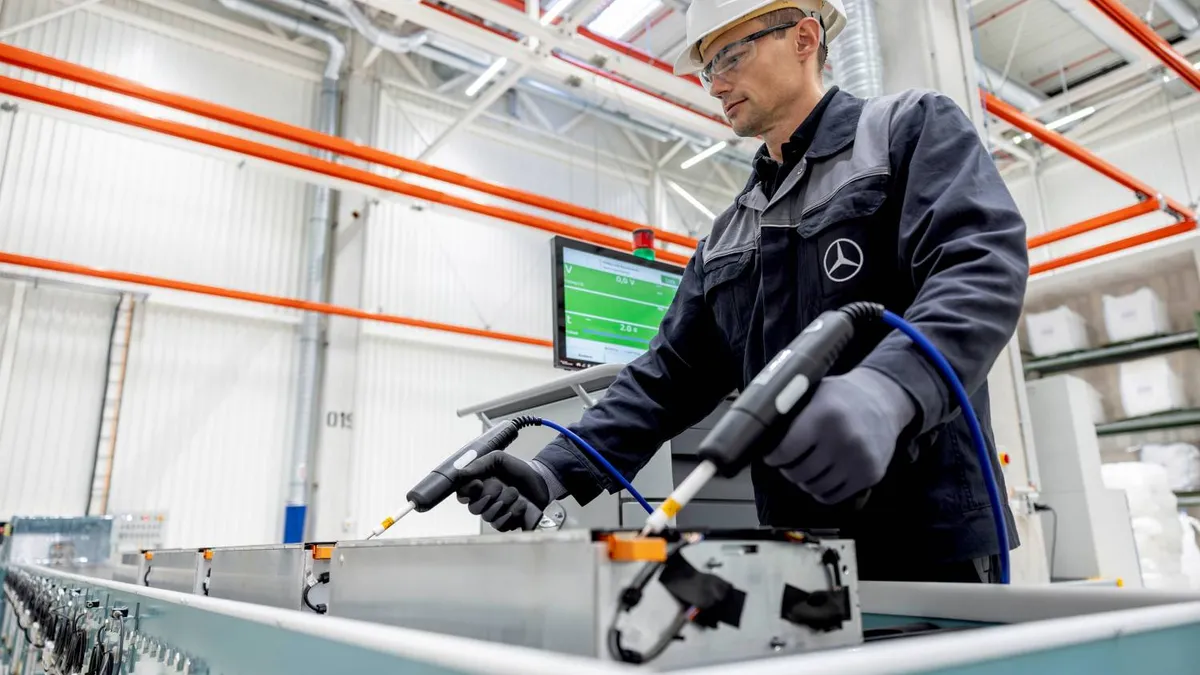Dive Brief:
- Mercedes-Benz has opened its own battery recycling plant in Germany that will process and recycle enough raw materials to produce more than 50,000 new battery modules per year, the automaker announced in a press release Oct. 21.
- The recycling facility is being funded by Germany’s Federal Ministry for Economic Affairs and Climate Action, as part of a scientific research project between three German universities. It will study the entire process chain for battery recycling, including logistics and reintegration back into the supply chain.
- It will also be Europe’s first battery recycling facility using a mechanical-hydrometallurgical process that can recover up to 96% of critical raw materials used in battery production, including nickel, lithium and cobalt, according to the release.
Dive Insight:
The automaker said it has invested “tens of millions of euros” in the construction of the factory and is the first car manufacturer worldwide to “close the battery recycling loop” with its own in-house facility.
The battery recycling plant is located in Kuppenheim, Germany, and has an annual capacity of 2,500 tonnes, but the knowledge gained from operating the plant may further boost production volumes in the medium-to-long-term, according to the release.
“Mercedes-Benz has set itself the goal of building the most desirable cars in a sustainable way,” said Ola Källenius, chairman of the board of management of Mercedes-Benz Group, in the release. “As a pioneer in automotive engineering, Europe's first integrated mechanical-hydrometallurgical battery recycling factory marks a key milestone towards enhancing raw-materials sustainability.”
The factory will also help Mercedes-Benz adhere to stricter regulations for battery recycling in Europe. In July 2023, the European Union passed a new regulation that will eventually require batteries in newly sold electric vehicles to meet specific thresholds of recycled content: 16% for cobalt, 85% for lead, 6% for lithium, and 6% for nickel. Batteries will also require labels listing the amounts of recycled material they contain by 2026 and a QR code by 2027.
“The future of the automobile is electric, and batteries are an essential component of this,” said German Chancellor Olaf Scholz, in the release. “To produce batteries in a resource-conserving and sustainable way, recycling is also key.”
Mercedes-Benz selected Primobius as its technology partner in the recycling plant, which is a joint venture between Germany-based mechanical engineering company SMS group and Australia-based Neometals, a developer of critical materials recycling technology.
The battery recycling process involves shredding battery modules, drying and processing active battery materials, while the plant’s multi-stage mechanical process will sort and separate plastics, copper, aluminum, and iron. The hydrometallurgical process will be used to recycle the active materials from the electrodes of battery cells individually, which will then be used to produce new batteries.
“The innovative technology enables us to recover valuable raw materials from the battery with the highest possible degree of purity,” said Jörg Burzer, member of the board of management of Mercedes-Benz Group responsible for production, quality & supply chain. “This turns today's batteries into tomorrow's sustainable mine for raw materials.”













